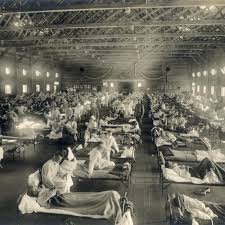Mahliat Tamrat ‘23
The Spanish Flu, caused by the H1N1 virus, was a deadly pandemic in 1918, inflicting a high mortality rate in people younger than 5 years old, 20-40 years old, and 65 years and older. The CDC reports that “the high mortality in healthy people, including those in the 20-40 year age group, was a unique feature of this pandemic.” Alternatively, the COVID-19 pandemic identifies older people and those with weakened immune systems as the high risk populations. Like COVID-19, initially, the 1918 virus was not well understood and non-pharmaceutical approaches were implemented due to the lack of proper scientific technology. These safety precautions, similar to COVID-19 measures, included self-isolation, quarantine, increased personal hygiene, disinfectant use, and limitations to numbers at public gatherings.

Photo courtesy of Ashley Kennedy
At the time, the EA community’s primary concern was World War I, but the pandemic still altered daily life. For both the Spanish Flu and COVID-19, administration proceeded with caution, yet technology gives modern-day EA an advantage that was not present before: versatility.
Today’s students have access to technology for remote learning. Online platforms such as Zoom and Google Classroom are both used at EA for conducting online school. Josephine Buccini ‘21 elaborates, “Although I prefer in-person learning, it is nice to have more time and sleep in sometimes.” In contrast, in 1918, there was no way for the students to continue their education while school was closed. An article, assumed to be written by Editor-In-Chief Thomas R. Neilson Jr. (Class of 1919), in The Scholium from October 1918 discusses the impact of not being able to learn, “Returning to our work, we can but do the best that is in us to make up lost time and to actually prepare ourselves for the great world that is being cut out for us day by day by the world war.”
The school’s initial three week closure due to the 1918 pandemic impacted a variety of school activities, including the play and orchestra. The 1919 Tabula describes, “Due to the influenza epidemic the Domino Club was forced to abandon the custom of giving its play during Christmas break. It was, therefore, necessary to postpone the date of the tenth annual performance until after the holidays.” Similarly, the 2020 Domino Club was unable to host an in-person production because of COVID-19 restrictions. Instead, the cast performed a play designed to be virtual. Morgan Bramwell ‘21 explains, “We either filmed on Zoom with green screens or we filmed in-person in the Blackbox theater with green screens.” At the time, the fairly small orchestra had just been established, but was able to survive due to “the untiring efforts of Mr. Norden [Orchestra director at the time], whose enthusiasm is the cause of its success, the orchestra has accomplished much in spite of epidemics and other hindrances.” Today, in order to follow CDC guidelines, the orchestra split into groups to reduce the number of people and spread out around the room to practice. Chris Lo ‘21 says that “it was tough knowing that we wouldn’t be able to have a ‘concert’ in the normal sense of the word. We ended up putting together a recorded piece.”
Another similarity between EA students then and now is their ability to adapt to new circumstances. In the same article mentioned above, Neilson writes, “No matter how inconvenient the order for closing the schools is, no matter how much trouble we have been put to, and how much the program of the school has been distorted, we cannot but see the wisdom of this action, rising from sheer necessity.” Even though EA students in 1918 only closed for three weeks, they understood that closing was necessary to make sure everyone stayed healthy. Similarly, Tracy Rosenberg ‘21 feels that “closing is not ideal, but I understand that adjustments must be made during a global pandemic.” Zachary Richards, VI Form Dean, believes that EA will get through the pandemic “Just as we did in 1918 and in other difficult years” by making sure that the EA community remembers to “hold on to [its] core values. We cannot lose our sense of decency. Put the needs of others above your own. We will be in a much better place as people for exercising such selflessness during a most challenging and trying time.”